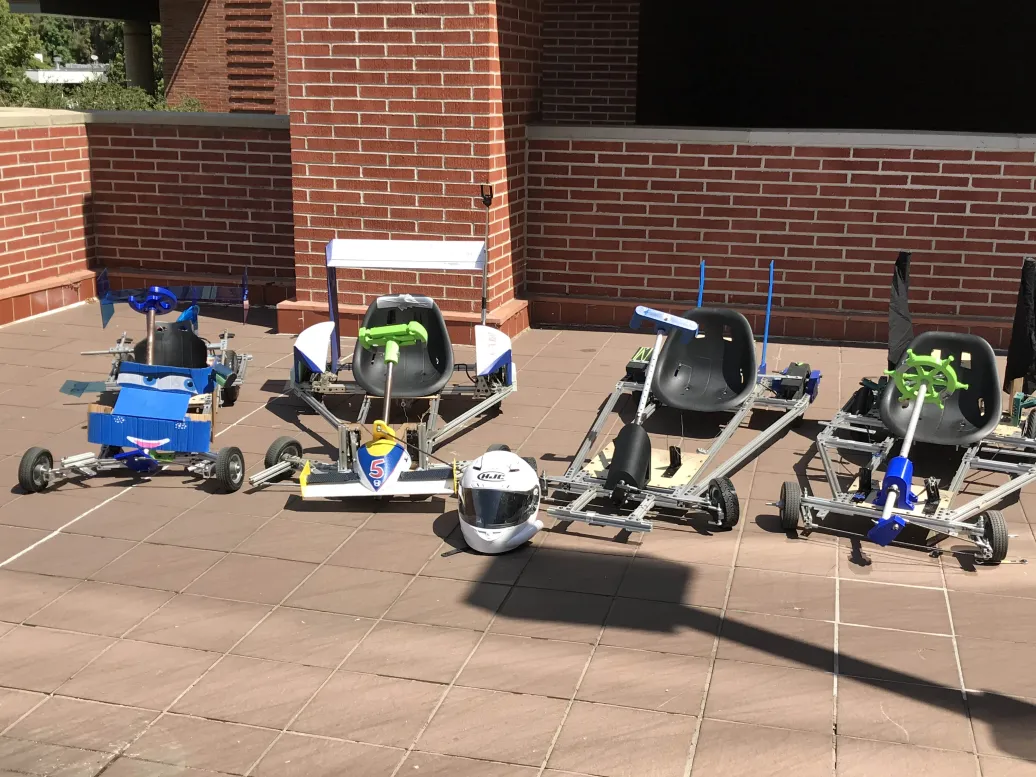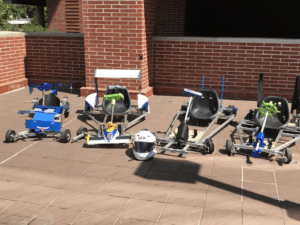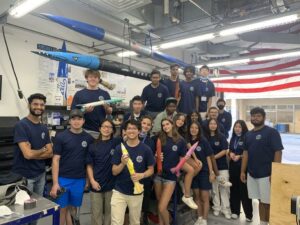Learn the principles of engineering to design, build and test a real-life vehicle or device

Use engineering design software and materials to construct a mobile robot, smart electronic systems, a rocket, or a Go-Kart
UCLA Engineering Design is a 3-week experiential program offering an introduction to engineering design while building teamwork and communication skills in a university setting. Participants will examine engineering majors offered at UCLA as well as explore a variety of engineering careers. The program centers on the completion of hands-on engineering design projects, and coursework includes the preparation of a short report describing those projects as well as a presentation of results. Specific project details and relevant majors explored vary with instructor.
(Go-Karts)

(Microcontrollers)
(Rovers)
(Rockets)
Engineering Design
The Summer Precollege Engineering Design program is introductory, with no previous experience required. Each session offers different tracks to choose from. Each track is supervised by UCLA faculty, with the main instruction and mentorship provided by experienced and trained UCLA undergraduate student mentors.
Mechanical Engineering – Go-Karts
This practical course aims to teach prospective engineers the thrill of a multi-discipline, end-to-end team-based engineering design. As with most large projects, they are broken into smaller cycles that will be solved independently, then integrated together. This project is constructed in such a way to optimize the student’s time in each step of preliminary design, Computer Aided Design, Finite Element Analysis, machining, detailing electric motor performance, and finally presenting their ideal Go-Kart. Students have creative freedom in the following areas: driver posture, steering and braking mechanisms, chassis layout and driver interface system. Over the course of the project students will learn how to give technical presentations and learn fundamental engineering concepts. At the end of the course, teams will participate in a competition where they will give a design presentation and drive their vehicle through a timed track. The presentation will allow students to consider their design process and consider ways in which they can be more efficient. The kart race provides the source of system goals for their go karts. The program’s design, build, test cycle will mimic working in a real-life, collaborative industry environment. Mentors will define the big picture and assist in removing impediments to progress.
Electrical Engineering – Microcontrollers
Students learn concepts in electrical engineering and computer programming to create microcontroller programs interfaced with electronic circuits that measure temperature, control motors, and communicate with external integrated circuits, including digital audio. Students will also learn to program computer interfaces that integrate hardware and software, creating a simple video game controller, Pong video game, pinball machine, and more. Basic CAD will also be covered to allow students to design and build physical realizations of their projects using equipment in the Engineering Makerspace using 3D printers and laser cutters.
Aerospace Engineering – Rockets
This course is meant to introduce high school students to the world of rocketry through a team-based prototyping and real-world testing process. Students will learn the fundamentals of engineering design and communication, utilize Computer-Aided-Design (CAD) tools like SolidWorks, and apply it to rocket-design using OpenRocket. They will take these designs and build rockets through composite-material layups, 3D printing, laser-cutting, and more manufacturing techniques in teams. Students will also learn electronics and sensor-programming in Arduino for the purpose of flight data-analysis on their rockets. Finally, they will learn how the projects and knowledge acquired in this program apply to the aerospace industry through physics-based Rocket Deep-Dive presentations. Students will have multiple prototyping workshops and launch opportunities. The course will culminate in a final project rocket that will launch several thousand-feet high and be launched at the Santa Fe Dam Recreational Area or the Mojave Desert, TBA.
Mechanical/Electrical Engineering – Rovers
Students use concepts and tools in mechanical engineering, electrical engineering, and computer science to design and build microcontroller controlled rovers under wireless command that are also able to autonomously navigate and respond to environmental cues. Students design and fabricate robot chassis, connect motors and control/sensory electronics, and program rover systems to map its environment and achieve mission objectives. Student team projects culminate in final competition including mapping and navigation through an unknown course and oral presentation.
Applications are reviewed and admission to the program is granted on a rolling basis starting February 18th. The Engineering Design program traditionally receives an exceptionally high volume of applications. Applying at your earliest convenience, preferably at the start of the enrollment period, is highly recommended.
The program has application requirements for admission. Eligible applicants who successfully submit all requirements will be reviewed and notified via email of an admission decision within 3 weeks.
Applicants are required to provide the following during the online registration process:
- An unofficial transcript from grade 9 to present reflecting a cumulative GPA of 3.2 or higher for the Go-Karts, Rockets, and Rovers tracks OR a cumulative GPA of 3.5 or higher for the Microcontrollers track.
- If your school transcript utilizes a different grading system, please submit your transcript as is. If available, please attach a translation/equivalency guide.
- INTERNATIONAL STUDENTS: If you are an international student, a transcript refers to your complete secondary academic record. To learn more about converting your grades into a US-based GPA, please click here.
- If your school has a translation/equivalency guide, please also include it with your transcript. If you do not have a translation/equivalency guide, please still submit your most up-to-date transcript as is for staff to review.
- Value statement: At the time of registration, ALL applicants will be prompted to submit a few short sentences reflecting on their pursuit of participation in the UCLA Summer Precollege Focus Series. Please note that students are strongly discouraged from relying on ChatGpt/AI tools for their application responses and are encouraged to submit original and authentic answers.
Engineering Design is a commuter program and does NOT provide on-campus housing. However, students who are 17 or older as of June 22, 2026, may independently apply for housing through UCLA Housing.
Participants of Engineering Design must commute to the UCLA campus each day of the program. Specific location information (e.g. classroom) will be provided to enrolled students closer to the start of the program.
Parking
Summer Sessions parking permits will be available on a first-come, first-served basis. Students have the option to purchase a summer term permit or a daily permit.
Please review the Transportation and Parking Services web page and read the “Summer Quarter Parking (All Students)” section for more information on all permit types, including cost.
Coursework
Engineering 1GK (Go-Karts)/ Engineering 1A (Microcontrollers)/ Engineering 1RK (Rockets)/ Engineering 1AR (Rovers); 2 units
Grading
Students will receive a letter grade upon completion. See University Credit, Grades and Transcripts for more information about academic credit.
In order to successfully complete the program, students must not have more than 2 excused or unexcused absences.
UCLA Summer Sessions Summer Scholars Support
Qualified students attending grades 9th – 11th in Spring 2026 in the state of California may be eligible for Summer Scholars Support, a need- and merit-based scholarship offered by the UCLA Summer Sessions Office. Students must be 15 years old by the first day of Summer Sessions 2026 on June 22nd in order to participate in the Summer Precollege Focus Series and/or apply for Summer Scholars Support. A limited number of full and partial scholarships are available to support enrollment in SCIP/eSCIP, one Summer Course, or the Summer Precollege Focus Series.
Summer 2026 deadline to apply: March 15 (5 pm PST).
Session A: June 22, 2026 – July 10, 2026
Session B: July 13, 2026 – July 31, 2026
Program Type: Commuter
Program Eligibility: 9th-11th grade in Spring 2026*
Application deadline:
- Session A: June 12, 2026 (5pm PT)
- Session B: July 3, 2026 (5pm PT)
Enrollment Deadline:
- Session A: June 19, 2026 (12pm PT)
- Session B: July 10, 2026 (12pm PT)
*All participants must be at least 15 years of age by the first day of Summer Sessions 2026 on June 22nd, no exceptions allowed.
The schedule and syllabus are subject to change. Enrolled students will be given updated materials closer to the program start date.
Fees and Payment Info
The program fee includes the unit fees for the UCLA coursework offered as part of the program and thus varies by UC student status. In addition to the program fee, students are assessed other campus and administrative fees during the summer. This is a summary of fees that commonly apply to the selected student type.
Actual tuition and fees are subject to change by the University of California. Visit the fees, payment, and financial aid section for important disclaimer, as well as more details on fees, payment instructions, and information on delinquency, refunds, and financial aid.
Engineering Design FAQs
Yes, the course may be repeated once for credit with topic or instructor change. Thus, students may take a total of two different tracks at any point in time.
Students will need to have a basic knowledge of and some experience in engineering and/or science.
The Microcontrollers and Rovers tracks require students to bring their own laptop on which they can download software and connect to USB.
A mouse is recommended as well.
For the Go-Karts track, a laptop and mouse are recommended.
Still have questions? Check out the general Summer Precollege Focus Series FAQ.



